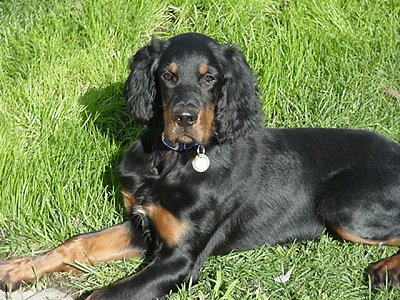Why Does My Dog…?
Although much recognised in humans, stress is rarely considered as a contributory factor in behavioural changes in dogs. In humans, doctors recognise the fact that stress is a major cause of many physical ans psychological illnesses, yet we are less ready to consider how our dogs cope with the stresses and strains that our modern environment places upon them. We might recognise as fearfulness the fact that some dogs, on being taken into a do club for the first time, will salivate, hold their ears back, tuck their tails between their legs, leave sweaty paw prints on the floor and, in some cased, urinate. Unfortunately, all too often the advice given to the owner is that they will ‘get used to it’. What we don’t recognise is that pro-longed exposure to this fearful environment will drain the dog’ stress reserve level and its ability to cope – much as it does in people.
What to Feed your Gordon Setter
 The Grodon Setter is the only breed of dog called “Setter” originating in Scotland. The Duke of Gordon developed this specific breed at the kennels on his estate. He developed it to be both a working and hunting dog. They herded sheep and pointed to feathered game for sportsmen. This combination was ideal for gentlemen who needed a working do for most of the week and a good hunting companion for the week end.
The Grodon Setter is the only breed of dog called “Setter” originating in Scotland. The Duke of Gordon developed this specific breed at the kennels on his estate. He developed it to be both a working and hunting dog. They herded sheep and pointed to feathered game for sportsmen. This combination was ideal for gentlemen who needed a working do for most of the week and a good hunting companion for the week end.
The Gordon Setter has a special need for a high fat content diet. this need for additional dietary fat is especially high when the setter is working or when it is under stress. Large quantities of water must accompany the additional dietary fat intake during these times. A sure sign that the dog requires additional fat in its dietary intake is a brittle coat. When the Gordon has the proper amount of fat in the diet, its coat is very soft. The best sources of fats for this breed are vegetable or poultry fats. the worst source of fat for the Gordon Setter is beef fat.
The Gordon Setter’s native environment in Scotland provided food sources of potatoes, wheat, corn, and poultry of the wild game variety. Therefore, I recommend a blend of foods that are high in their carbohydrate-to-protein ration as the ideal diet for the Gordon setter, The blend I recommend would contain potatoes, wheat, corn, and poultry. Conversely, I feel the worst blend would be white rice, soy, beef, or horse meat and their by-products.
What to Feed your Affenpinscher
 The Affenpinscher developed in the lowland farm area of Germany prior to the 15th century. It has a facial appearance similar to a monkey, and the literal translation of the German word Affenpinscher is “monkey terrier.” This breed of dog is very quick afoot and at one time earned its keep as an effective stable yard ratter.
The Affenpinscher developed in the lowland farm area of Germany prior to the 15th century. It has a facial appearance similar to a monkey, and the literal translation of the German word Affenpinscher is “monkey terrier.” This breed of dog is very quick afoot and at one time earned its keep as an effective stable yard ratter.
Native food supplies for this breed would have been rodents (rats, mice and other small ground animals), poultry, and farmland grains of wheat, corn and barley or alfalfa with ground vegetables of potatoes, carrots and cabbage.
For the Affenpinscher I recommend commercial foods that are high in their carbohydrate content from potatoes and barley. They meat protein source should be a blend of horse meat and poultry. I also recommend that you avoid feeding any foods containing soy. beet pulp, white rice, fish meal or lamb to an Affenpinscher.





